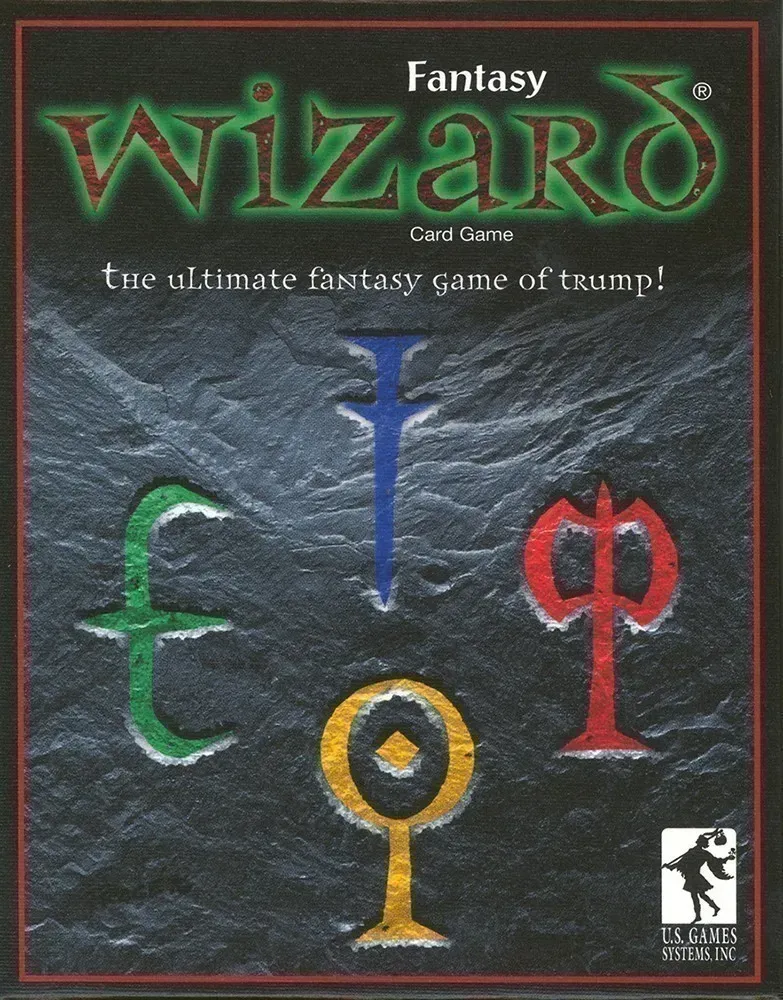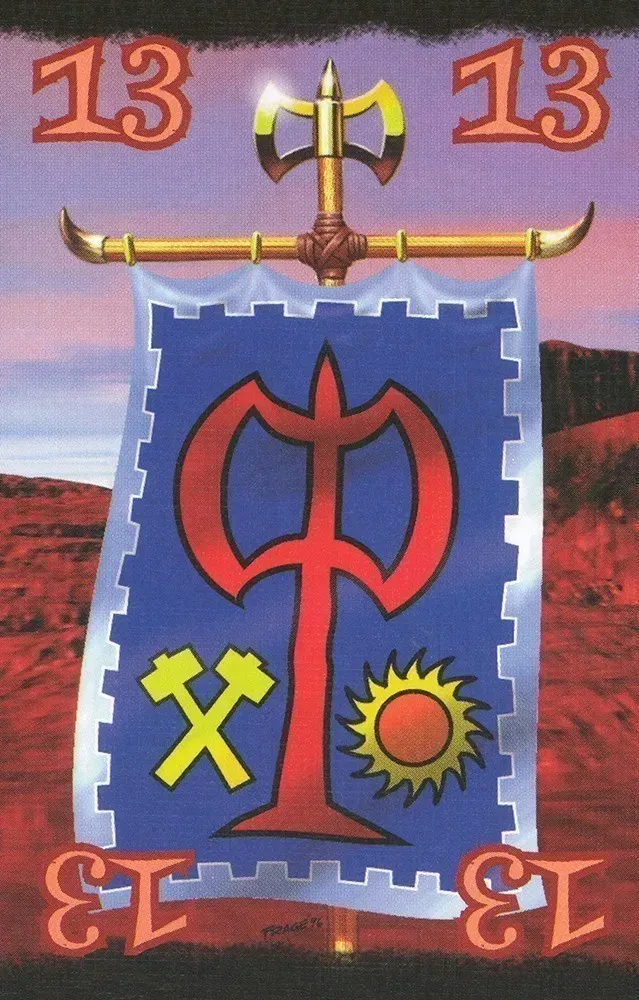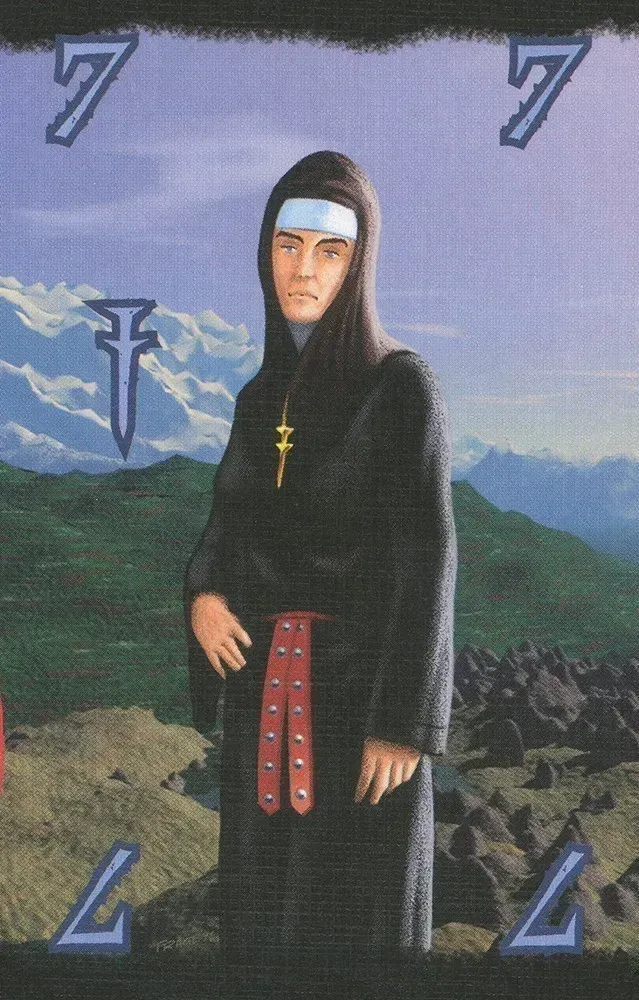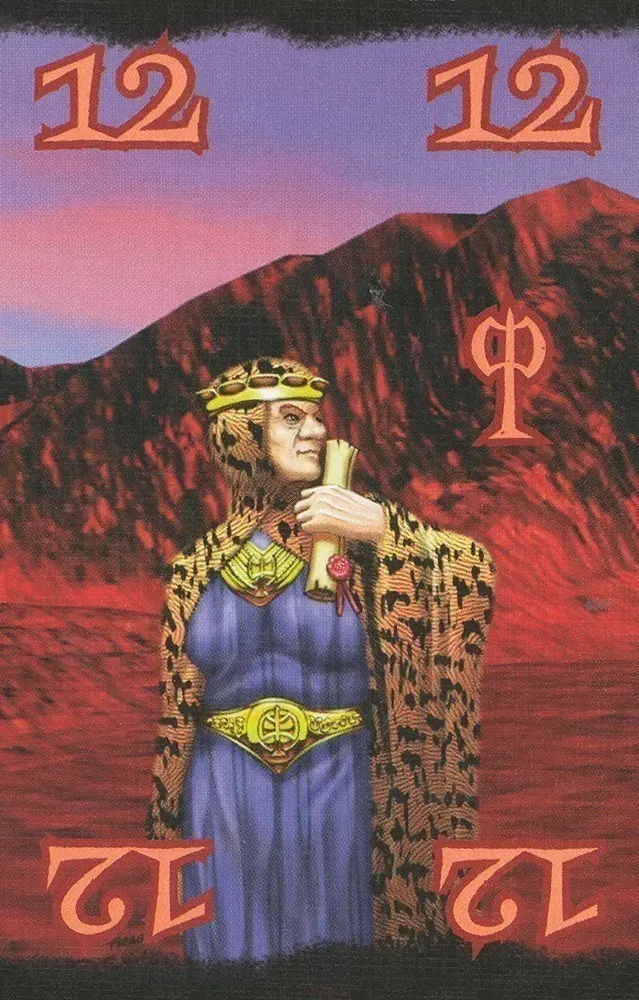
Based on the bestseller Wizard Card Game where correct predictions earn points, Fantasy Wizard re-imagines Wizard with sensational new characters and settings.
Wizard apprentices develop their powers of premonition by predicting the exact number of tricks they can win in each round of this enchanting card game. Correct predictions earn points. Humans, dwarves, elves, and giants compete for power, but none can conquer the all-powerful Wizards in this dynamic new game of trump. The apprentice with the most points at the end of the game wins. Fantasy Wizard Card Game comes with a full-color deck of character cards, including four Wizard Cards, which always win, and four Jester cards, which always lose. When battling for tricks, these wild cards must be played strategically. Game also comes with custom scorepad, and illustrated instructions. For 3 to 6 players, ages 10 and up.
Fantasy Wizard® Card Game is licensed in Austria, Australia, Belorussia, Canada, China, Czech Republic, England, France, Germany, Greece, Hungary, Indonesia, Ireland, Kazakhstan, Lithuania, Malaysia, New Zealand, Russia, Slovakia, Sweden, Switzerland, Ukraine, and the United States.
Wizard FAQs are available for download here.
Check out our entire line of Wizard® products
-
ISBN978-1-57281-655-8
-
SizeBox measures 3.5" x 4.75" ; Cards measure 2.25" x 3.5"
-
LanguageEN
-
AuthorKen Fisher
-
ArtistFranz Vohwinkel
What Customers Are Saying About Fantasy Wizard® Card Game
Fantasy Wizard is a game by Ken Fisher, published by U.S. Games System. On a player’s turn, they will look at their card(s) and try to predict how many tricks they will win that round. It’s best to use some type of marker(s) in front of the player to help remember the prediction number. From here, the first player will play the first card of the first trick. All the other players must play a card of the same color if possible. If they can’t they can play any other card or a trump card. The trump card will win against any other card from different colors. Wizards and Jesters can be played any time and they will always beat a trump card. Jester cards never win a trick. The highest played card will win that trick and will place all the card played in a pile in front of himself. That player will now start the next trick. This continues until all the cards from the player’s hands are gone. This will begin the next round. New cards are drawn based on the number of the round being played. Predictions are made again and play continues. The game ends when the deck of cards has been emptied.
COMPONENTS
For this version of the game, there aren’t a lot of components. There is a scorepad that’s nice for keeping track of everything. However the main attraction for this game is the cards. The artwork on them is beautiful. There is such a great fantasy theme feel on each one. The cards are sturdy enough for lots of repeated play. Once again, the production value was very high for this game. I love just looking at the cards. The only real thing that I felt was missing would have been some little plastic markers or cardboard chits of some kind to place in front of each player to keep up with their predictions.
8 out of 10
RULEBOOK
The rulebook is actually more of a rules scroll for this game. It’s very nicely done and explains everything very well. There’s nothing that’s hard to read or understand here. It has a few nice pictures on it and several examples of game play and scoring to help you out. I think it’s also really nice that for non-traditional card game players, it explains terms like tricks and trumps. The scroll is full color and fits in with the theme very well. Very nicely done.
9 out of 10
GAMEPLAY
This game is really simple and easy to play. It doesn’t take that long to play either. I like how easy this game can feel more like a take that kind of game. Later on in the game, you can really set it up so that the other player wins or loses those tricks to make them get negative points. In the beginning, I’d say most of the game is based on luck. However the longer you play, the more strategy it takes. I love the simplicity of this game. It’s really a fun game to play
9 out of 10
OVERALL
Fantasy Wizard is a light game of predictions and trick taking. The cards are truly amazing to look at. The game is lots of fun. It plays quickly with about a 30-45 minute playtime. Anyone that likes traditional card games like Rummy, Rook or Spades should really enjoy this one. The fantasy theme isn’t really all that deep here. It’s mostly painted on, but that doesn’t really matter to me. I loved looking at the cards as I played. For me, I wouldn’t have enjoyed the game nearly as much without this particular theme included. I definitely recommend giving it a try. I had a lot of fun with it and I’m sure you will too.
9 out of 10
—Jonathan Nelsen, Board Game Geek
You might be under the impression that in order to be fun a game has to be complex. It’s true that we tend towards games with a bunch of different components, sneaky player interaction and a little rule that you only get to use once in a while, but when you remember to do it people will stare at you in awe of your skill; or maybe stare at you with pure hatred for remembering that rule. It’s true that we review games from that part of town most often. That doesn’t mean we don’t enjoy games that are very, very simple – when they are also very very clever.
Ken Fisher’s Wizard is one of those games. You almost couldn’t ask for it to be any simpler. Wizard is a trick-taking game: there are four suits of cards with values from 1 to 13. After dealing, one of the remaining cards is revealed to determine the trump suit. The first player plays any card from his hand, the other players then have to follow suit or, if they cannot, either play a trump to win or throw in a card from another color to get rid of it. The trick goes to the player that had the highest trump or, if no trump was played, the highest card in the original suit. The first round is played with only one card per player, each subsequent round with one more until finally all 60 cards are dealt out on the last round, coincidentally not leaving a card to determine the trump suit.
There are two sets of special cards that add some spice: Wizards and Jesters. Both Wizards and Jesters belong to no suit but can be played at nay time, even when you could follow suit. The first Wizard in a trick always wins that trick, no matter what other cards are in it. A Jester never wins any tricks, except in the rare case that the trick contains only Jesters – in that case, the first one wins again. If a Jester is revealed for trump suit, this round has no trumps; in case of a Wizard the dealer chooses a trump suit after seeing his cards.
There is that final piece of rules that puts Wizard in the “very, very clever” category and made it popular enough all over the world to have its own world championship. Before the first card in a turn is played, every player must make a bet how many tricks he is going to take this round. The only way to score points is through fulfilling this bet: 20 for succeeding at all plus 10 for every trick you took. Any trick more or less than your bet not only gets you nothing at all for this round, you even lose 10 points for every trick by which you miss your bet. The most-played (and in my opinion most interesting) variant of Wizard demands that the bets of all players never add up to the real amount of tricks available, making sure that there will not be a peaceful solution.
And suddenly those very simple rules come together to make a much deeper and more enjoyable game than you would expect from “simple trick-taking”. In the first two or three rounds, there still is much luck involved: with only two cards, you’re not exactly drowning in strategic options and whether you win your bet or not depends heavily on card luck. But the first few rounds are only for warming up: from round five on, you have many more options to consider and many more ways to contribute to your own success. In this phase of the game, against experienced opponents, you have to pull all the registers: sometimes you want to rid yourself of a suit that you started with only one or two cards in so you don’t have to follow suit. Sometimes you need to find a way to lose high cards because you find that your bet was too low. You will want to base your bet on these and a couple of other things, like the number of Wizards and Jesters in your hand, but also your distance from the start player. And sometimes you just have to recognize a truly bad hand and bet low in order not to lose points. On the other side of things, a good hand has a strong push-your-luck element where you want to try for more tricks than you’re strictly comfortable with because more tricks still means more points. And there you have it: a game with very simple rules that is nevertheless engaging and quite difficult to master.
— Meople Magazine













